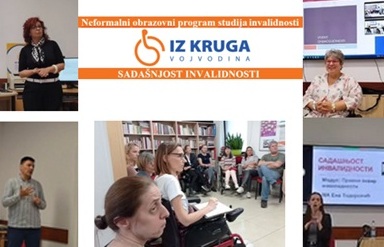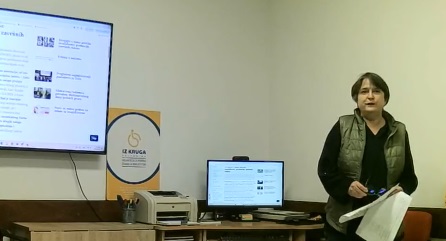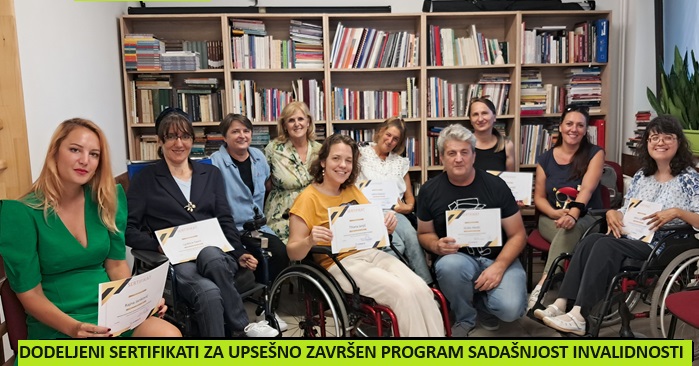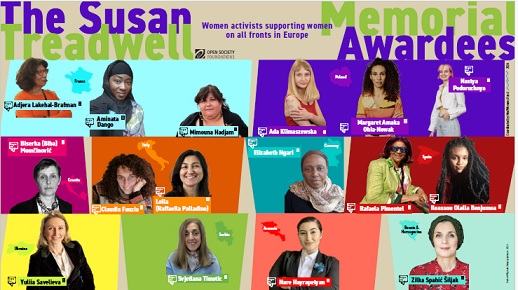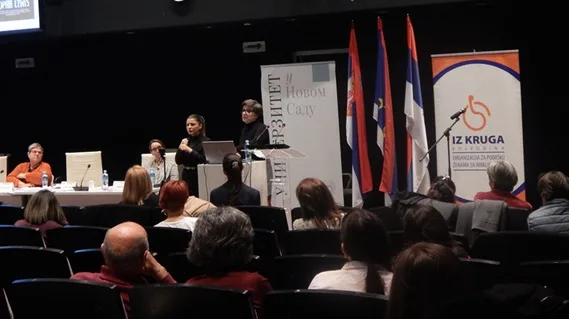NN is fifty-two years old, a retired nurse, and has Multiple Sclerosis. She is a mother of two grown-up children. After she had acquired disability, she survived partner’s violence. Now she speaks openly about her experience, facing mental distress, lack of systematic support, and discovering inner resources owing to which she overcomes new challenges. She wants women to know that disability is never the cause of violence.
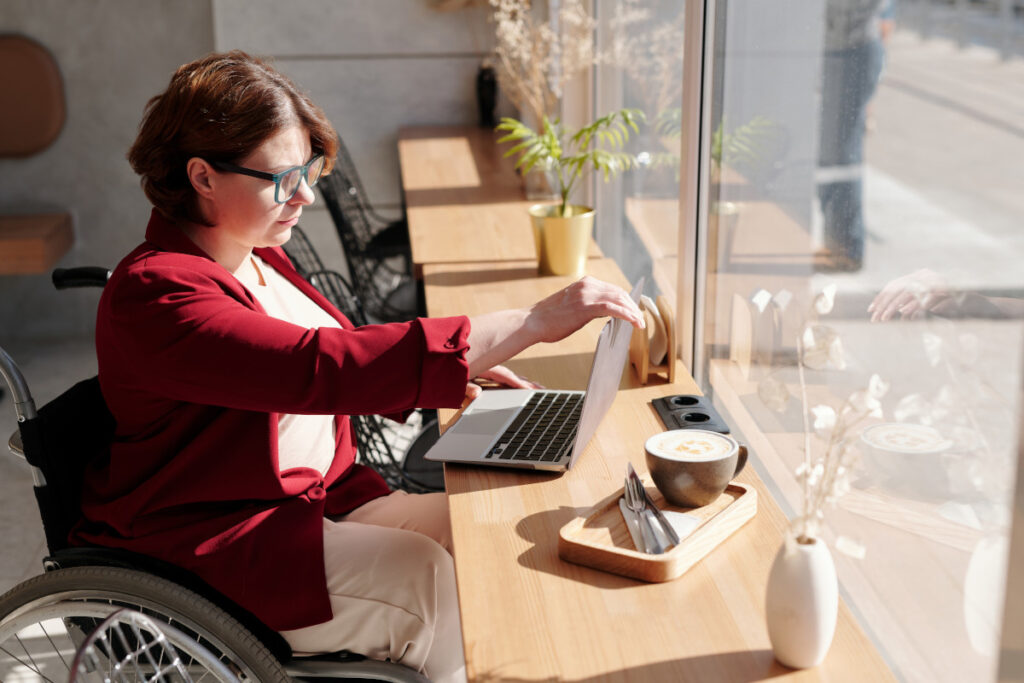
What changed in your life after acquiring the disability?
NN: I’ve always been a support to everyone, independent and strong, taking care of everything. I was employed, took care of a household and children, made sure everyone felt fine. I adored gardening, and I miss that mostly now. I believed we were a harmonious and stable family, more or less like the others in our environment. My husband and I had no marriage crises, not until I got sick. He didn’t fuss a lot about me not working like I used to – I might have understood that – but as if he got off on my weaknesses. He used to leave me waiting on purpose when I needed help. To endure. To be hungry an hour longer or not to take medicines on time, because of his negligence to go shopping on time. It appeared as if he had fun watching me suffer. He used to tell me: – Your time has passed; I’ve been under your shadow enough! The wheel of fortune keeps turning! I couldn’t believe my ears, was in shock. I tried to talk some sense in him. I thought we would go through the period somehow, that we both need time to adjust until we get used to my new condition. MS is unpredictable; there are good and bad days, coping with the changes is toilsome.
When did you realize that your relationship would not change and what was the moment you decided to break out of the circle of violence?
NN: I knew it was serious when he started threatening me. He used to tell me as if joking, that he could strangle me in my sleep. That I should be grateful if he puts me out of my misery. I dreaded going to sleep. I knew I had to do something to protect myself but didn’t know what. I was ashamed to talk about it. I have always been strong, relied on my resources, could do everything, and then… The worst part was that part of me believed maybe it was better to die. I would no longer be of use to anyone, not to my husband, not to my children, not to myself, not to anyone.
How did you overcome that mental health crisis?
NN: My daughter uttered a sentence that deeply engraved in my mind. She said: – Mum, the only important thing is that you are with us. Nothing else! Just be here! At that moment, I started regaining self-confidence, the value of life, whatever that life might be. I might not work physically as much and earn an income, but that is not a measure of my worth. We often identify with our vocation, roles, a position in society. I am a nurse, an employee, a wife, a mother. What happens when we stop playing those roles? What remains of our identity? What my daughter told me made me start to see who I am in my essence when I take off my uniform, apron, when I stop. I kind of started to comprehend that I am more important than what I can or cannot do. That it is important that I am here and that my experience has value.
What kind of support did you miss when it was most difficult for you?
NN: At the time I learned my diagnosis, children no longer lived with us, were independent; they visited, cheered me up. I didn’t tell them about the problems between my husband and me, didn’t want to make it their burden. I had no idea where to look for protection; calling the police was out of the question. How could I accuse a man I built a life with for years, made a family? Who would believe me? How would that influence children’s life? I didn’t want them stigmatized for something happening to me. I needed psychological help. It would be good if it existed within the health system. I couldn’t afford a private psychotherapist, and I would, with that kind of support, overcome facing the new situation, my health condition, and marital crises easier. I might have blamed and devalued myself less for all the things that were happening to me.
How did you get out of violence, and do you feel safe now?
NN: It wasn’t easy; a lot of people from my environment noticed I wasn’t OK but attributed it to MS and not to the abuse from my husband. Nobody could even suppose that. I think most of our friends and relatives sympathized with him, observing him as a victim of my condition because suddenly everything would fall on him. They encouraged both of us; disability inevitably changes the family dynamics, distribution of liabilities, everything… but it is not inevitable that anyone exploits my condition. I know it now. I confided in my sister, told her everything. Suddenly, it burst out of me. My daughter’s notice that she is with a child propelled me – as if I got a new urge for life. I remember telling my sister: – Listen, I want to be there for her! I want to watch my grandchild grow up. I packed my things and moved to my sister’s. My husband needs to pay out part of our property. I don’t bother much with it; it is consequential that my children get what belongs to them. I am on my property at my sister’s – we live in our family house, our parent’s house.
After you had left, was it really the end, or did your husband harass or persecute you in any way?
NN: It was the end for sure. As time went by, I started thinking he accomplished what he wanted. He was a saint in front of everyone, and he didn’t want to ruin the picture. Didn’t want people to say he left his sick wife. This way, the responsibility lies with me; I was the one that left. I guess it suits him. I think he was aghast when I found out the diagnosis. He was frightened for himself, what his life would look like, and had no strength to change his ways, adjust, make a decent arrangement. I don’t know; I keep thinking that it was his way to drive me off, so the responsibility for not being able to keep on going was mine.
Why do you find it significant to share the experience?
NN: It wasn’t until I started talking more openly about what had happened to me that I knew I had managed to overcome it. Not only that keeping a secret is ponderous, but it is as if we accept the blame and shame imposed on us. I refuse to do it anymore like I refused to live in fear. I knew it was significant to share my life and maternal experience with my daughter when she became a mother, and I know it is equally important to share this kind of experience. It might encourage some women not to give up, to talk, to gather strength, and find a way out. To understand that the cause is not that she has a disability but in the helplessness of the one who humiliates her, in his fears, in his inability to cope with life. That she will realize she is mightier than she thinks.
The preparation of this media report was supported by UNDP within the project „Integrated Response to Violence against Women and Girls in Serbia III“. The views expressed in the media report are the sole responsibility of …IZ KRUGA – VOJVODINA and do not necessarily reflect the views of UNDP or other participants in the implementation of this project.
